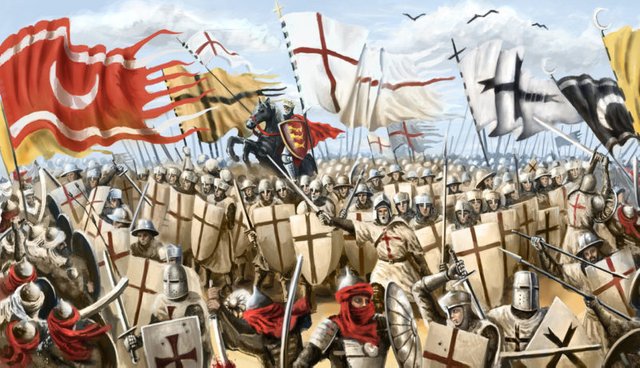After long debates, they agreed with King Baldwin III. from Jerusalem to attack Damascus. But despite the immense troop strength also failed this military enterprise. On July 28, 1149, the crusaders had to give up the siege after a short time and retire, because Muslim replacement troops had come dangerously close. With this shameful retreat, the morale of the men was finally broken.
Konrad hurried back to Thessalonique to conclude a contract with Manuel against the Norman King Roger II of Sicily.
Ludwig coped less well with the defeat. He saw the blame for the failure of the entire Crusade alone on the part of the Byzantine emperor and therefore accepted the offer of Roger II to plan a new crusade - this time not against the "godless" Turks, but against the Christian Constantinople. Manuel's tactics had not only created friends for the Byzantine Empire. Peace treaties with Genoa and Pisa faced the more or less open enmity with the Pope, the Normans and not least with Venice. When in 1171 all the Venetians in the kingdom were arrested and their possessions were confiscated, the cask was overflowing. From now on, the up-and-coming city-state thought of definitively putting its opponents on the Bosporus in its place. The disaster of the Second Crusade had greatly strengthened the position of the Muslim princes. In the following decades, they continued to expand their rule and conquered Egypt in 1171, then Syria and finally threatened the kingdom of Jerusalem in 1187. On October 2, 1187, the city passed into the hands of Saladin, the sultan of Egypt. In contrast to the Crusaders, he renounced after the conquest on a bloodbath among the population. The shock could not have been bigger anyway. Only a few weeks later, Pope Gregory VIII called for the Third Crusade, and the echo was again overwhelming. The reconquest of Jerusalem was a goal with which the masses could identify. But not only the population was behind a renewed crusade, even the most important European rulers supported the firing into the unknown. Emperor Frederick I Barbarossa, the French King Philip II August and the English King Richard I Lionheart were the most prominent figures. However, it was finally clear that the weapon aid for Constantinople in the planning no longer played a role. The initiators of the company had long been pursuing their own goals and degrading Byzantium to a troop deployment area for the reconquest of Jerusalem. Frederick I, who made no secret of his aversion to Constantinople, took the land route with his troops and advanced from Hungary to Byzantine territory in 1189. Isaac II. Angelos, who had been appointed Emperor four years earlier, had learned from the mistakes of his predecessors and tried to protect himself from Frederick through an alliance with Saladin. And he succeeded in persuading Frederick to bypass Constantinople and cross over to the Dardanelles.
Richard and Philip took the sea route to Palestine. While the Frenchman went straight to Akko, Richard made a stopover in Cyprus, which he conquered in a few weeks and then made a gift to the King of Jerusalem. Thus, part of the Byzantine Empire had changed hands without the Emperor in Constantinople being able to do anything about it. The further course of the crusade was less successful. Frederick Barbarossa drowned before he reached Jerusalem, and his army broke up. Although Philip and Richard conquered Akko, they soon got into an argument and Philipp returned to France. Richard stayed in Palestine for a full two years without being able to recapture Jerusalem. Although Constantinople had once again escaped with a black eye, the third crusade had nevertheless ushered in the downfall of the empire. The confrontation with Venice, which provided the isolated Crusader states with goods through its fleet and thereby earned a fortune, now went into the hot phase. The Emperors in Constantinople slowly began to realize that they were moving away from the legacy of the Roman Empire to an insignificant province on the edge of Europe.

Very interesting history. Thank friend for your post
Downvoting a post can decrease pending rewards and make it less visible. Common reasons:
Submit